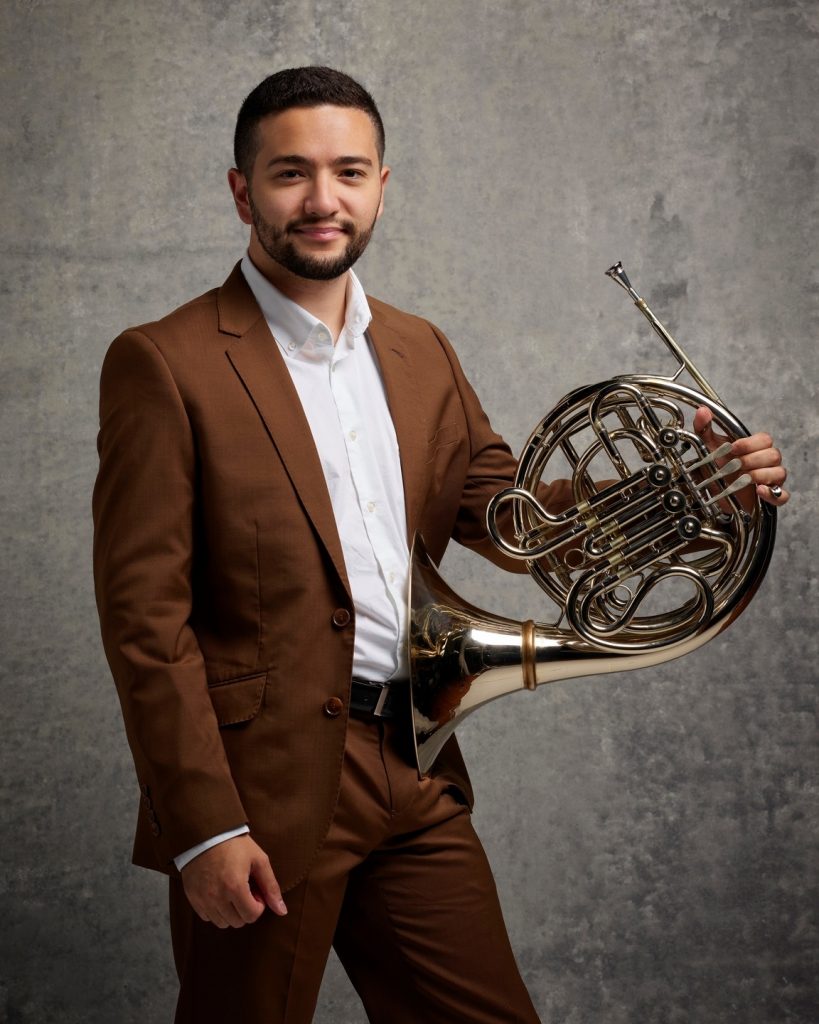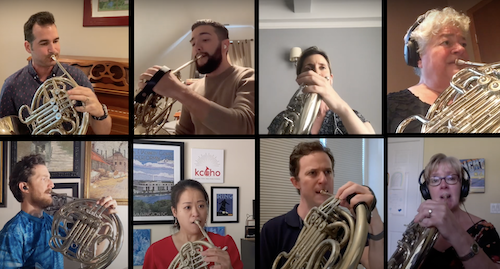by Jarrett Hoffman

First, there are a number of Silberschlags. Second, there are several people from the state of Maryland. Third, there are a lot of horns.
As for those first two points, Cleveland Orchestra principal horn Nathaniel Silberschlag has put together a roster that makes good use of both his family and his hometown. He’s joined by his brother Zachary (principal trumpet in the Hawaii Symphony), their father Jeffrey (a trumpeter who chairs the music department at St. Mary’s College of Maryland), and other musicians from St. Mary’s County, as well as Baltimore.
Then, Silberschlag went a step further and rounded up a gang of fellow horn players from the Kennedy Center Opera House Orchestra, National Symphony, San Francisco Opera, and Metropolitan Opera Orchestra as a way to highlight their particular brand of horns, and to provide a potentially mesmerizing send-off.
With that big roster in mind, I began my recent Zoom call with Silberschlag by asking a very simple question: how’d you make all of this happen?
“It started as a product of quarantine, actually,” the hornist said. “When the Orchestra’s season got cancelled, I went home to be with my family in Maryland, and I was there for basically five months.”
Practice-wise, that was a good thing. “When you don’t have anything on your plate, it’s easy to just put the horn in the closet, but I was very lucky. My brother and my dad are trumpet players, and my mom’s a bassoonist, so we kind of keep each other honest. It’s not like, ‘Hey, go practice,’ but if you hear someone playing, you feel like, ‘Oh man, I should go practice now.’”
You never know when someone in the house might feel the itch. “There was a moment when my brother and I were just sitting there watching football,” Silberschlag told me. “He said, ‘You know, I think I’m going to warm up.’ I said, ‘No, please, you can’t warm up because then I have to warm up!’”
In part just to make some recordings, and in part as material for the online version of their father’s summer festival at the College, a plan for the quarantine began to take shape.
“Two of my brother’s friends are a videographer and an audio engineer,” Silberschlag said. “They had never done much with classical music — it was predominantly things like indie rock in Baltimore — but we asked if they would consider doing a couple of day-shoots. We started filming some music we wanted to play, and it kind of grew and grew until we had a lot of good content.” It’s those recordings that MFTWR audiences will hear during the majority of Sunday’s recital (more on those pieces later).
And what about all those horns?

“She came to us and said, ‘I want to get the Conn 8D sound out there.’” (As Silberschlag explained, that’s the model of the instrument played by hornists from his schooling — and by the horn section of The Cleveland Orchestra.) “She said that especially, there aren’t a lot of new performers nowadays playing on 8D’s — there’s not a lot of content out there.”
And so, Silberschlag and Pilkington brought their octet arrangement of Eric Whitacre’s Sleep to Landsman and five other friends and colleagues in the world of Conn 8D hornists. Together — albeit remotely — they created a performance via click track.
Before making this last point, I should note that there’s plenty of emotional variety in the program, from Saverio Mercadante’s Fantasia su “Il giuramento” to Jean-Francois Michel’s Klezmerelda and Franz Strauss’ Introduction, Theme, and Variations.
But there’s also a thread of peace and spirituality that runs from that closing Sleep back to the opening of the program, Laudatio (“Praying”) by Bernhard Krol, and through Richard Smallwood’s Total Praise and the hymn Let Us Break Bread Together.
Silberschlag agreed. “Obviously, with the state of our country and world,” he said, “I’ve been trying to give back with something meditative and healing.”
Published on ClevelandClassical.com October 6, 2020.
Click here for a printable copy of this article


